A wide variety of gods have moved in and out of power over the many millennia since Sanctuary was formed. The most powerful gods are those whose statues sit on the Arcanum Crystals at the five kingdom capitals. This page describes those gods, their related divinities, and those gods currently worshiped by the Noble Houses. As noble houses come and go, this page will need to be updated.
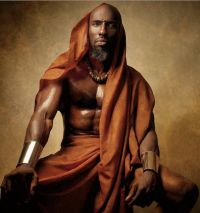
|
- Acrab
- Acrab, is, a male Apollonian-Thoth like god of writing, magic, wisdom, music, truth and prophecy, healing, the sun and light, plague, and poetry. The scorpion king's form is unknown. This god is rarely if every seen, and he speaks through his prophets. Acrab is a generous if not warm deity. His blessings come in the form of fertility, luck, riches and intellectual enlightenment. His expectations are steep and while rarely seen, the weight of his displeasure will come if justified. Stories tell of a family who had broken hospitality and slew their guests, and were found later their bodies stung to death by deadly temple scorpions, only the children were spared.
|
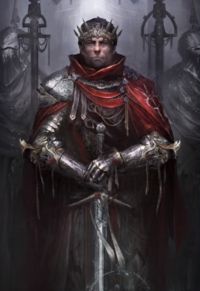
|
- Brutus
- God of justice, judgement, and valor, an ascended ancient king of the Dúnadan who wandered the world as a questing knight-errant.
|
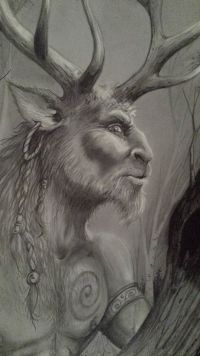
|
- Cernunnos
- The great horned lord of the untamed forests
|
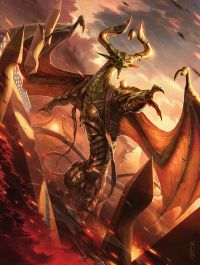
|
- Io, occasionally known as Asgorath or Asgoroth
- A neutral primordial over-deity, father to dragon gods and is worshipped across many a world by other names. An entity of seemingly conflicting motivations and alignments, known for doing either very little or a whole lot depending on the incarnation. Anyone who views dragons with awe or wishes to imitate them can turn to Io for guidance and strength.
- Although Dragons in their own right, Jormungandr and Ancalagon who form the world here are viewed by many of the Children to just be another pair of Primoridal children of Io.
|
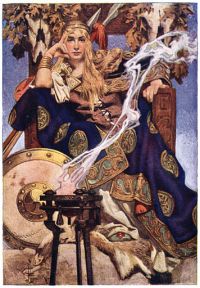
|
- Queen Medb (Mab)
- "O, then, I see Queen Mab hath been with you. She is the fairies' midwife, and she comes... In shape no bigger than an agate-stone. Drawn with a team of little atomies, Athwart men's noses as they lies asleep..." --William Shakespeare
- Mab is typically thought of a benevolent, but extremely mischievous, midwife and trickster goddess of faerie. She helps to "deliver" humans of their innermost desperate desires, which come to fruition in the form of Dream. She typically appears in the form of something like a pixie. The fey folk are many and varied in their allegiances, but Mab is thought to be a figure that provides guidance, favorable luck, and happiness for fey folk who wish to perform tricks, minor glamours or blessings, or more vengeful pranks in her name.
|
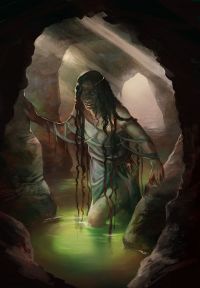
|
- Manea
- Goddess of the undead, ghosts, and other spirits of the night
|
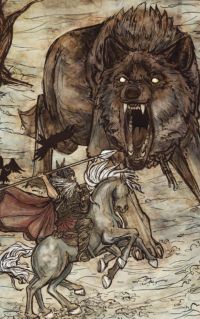
|
- Odin and Fenrir
- The Valdrdómr worship Odin and Fenrir above all else. An interesting combination considering both Gods have been shown to be in opposition. Like Odin, the Valdrdómr seek knowledge—in particular why they have been chosen to inhabit this new world—and are determined to gain it by any means necessary. They also show devotion to Fenrir, who is often depicted as a monstrous wolf, because while knowledge is valued and sought, those of the Valdrdómr recognize something primal and reckless (that often cannot be ignored), lives within all men and women. Additionally, they often compare themselves to the great wolves Odin has; Geri (the greedy one), and Freki (the ravenous one), since they are both greedy and ravenous for glory.
|
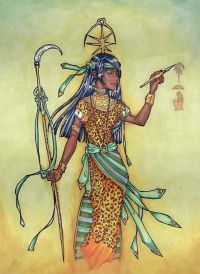
|
- Seshat
- Goddess of knowledge, wisdom, writing, and mathematics. It is said that in the earliest days of civilization, she invented writing and taught it to her followers, allowing the history and knowledge of all peoples to be recorded for eternity. Buried by history and overshadowed by gods like Thoth and Acrab, She who Scribes has come back into prominence recently as the guardian of knowledge. Fair, logical, and ever-curious, the Lady encourages her followers to seek out and record the world's knowledge for the betterment of all people. In the eyes of the Goddess and her followers, to discover new knowledge is the greatest gift, to protect it is the most noble calling, and to destroy it is the most grievous of sins.
|







